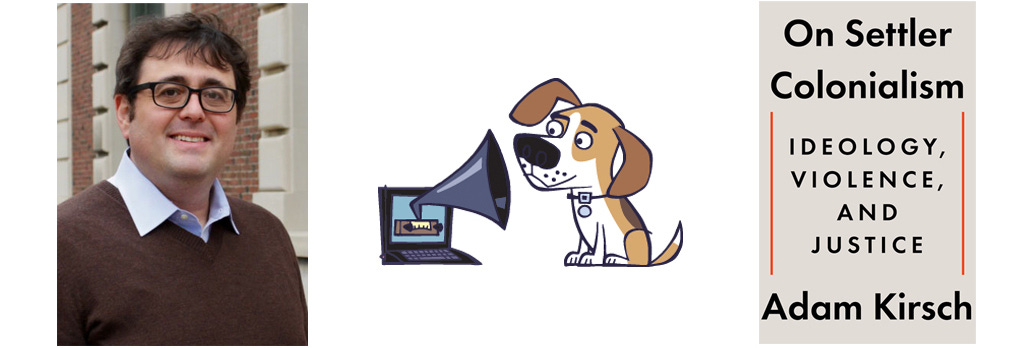Adam is a literary critic and poet. He’s been a senior editor at The New Republic and a contributing editor for Tablet and Harvard Magazine, and he’s currently an editor in the Wall Street Journal’s Review section. The author of many books, his latest is On Settler Colonialism: Violence, Ideology and Justice. I’ve been fascinated by the concept — another product of critical theory, as it is now routinely applied to Israel. We hash it all out.
For two clips of our convo — on the reasons why Europe explored the world, and the bastardization of “genocide” — pop over to our YouTube page.
Other topics: Adam’s roots in LA; coming from a long line of writers; the power of poetry; its current boom with Instagram and hip-hop; Larkin; the omnipresence of settler colonialism in human history; the Neanderthals; the Ulster colonists; the French in Algeria; replacement colonialism in Australia and North America; the viral catastrophe there; the 1619 Project; “decolonizing” a bookshelf; Marxism; Coates and fatalism toward the US; MLK’s “promissory note”; Obama’s “more perfect union”; migration under climate change; China the biggest polluter; More’s Utopia; the Holocaust; the Killing Fields; Rwanda; mass migration of Muslims to Europe; “white genocide”; Pat Buchanan; the settler colonialism in Israel; ancient claims to Palestine; the Balfour Declaration; British limits on migrant Jews in WWII; the US turning away Holocaust refugees; the UN partition plan; the 1948 war; the Nakba; Ben-Gurion; Jabotinsky’s “Iron Wall”; Clinton’s despair after 2000; ethnic cleansing in the West Bank; the nihilism of October 7; civilian carnage and human shields in Gaza; Arab countries denying Palestinians; a two-state solution; the moral preening of Coates; and the economic and liberal triumphs of Israel.
Browse the Dishcast archive for an episode you might enjoy (the first 102 are free in their entirety — subscribe to get everything else). Coming up: Andrew Neil on UK and US politics, John Gray on the state of liberal democracy, Jon Rauch on his new book on “Christianity’s Broken Bargain with Democracy,” Sebastian Junger on near-death experiences, Evan Wolfson on the history of marriage equality, Yoni Appelbaum on the American Dream, Nick Denton on the evolution of new media, and Ross Douthat on how everyone should be religious. Please send any guest recs, dissents, and other comments to dish@andrewsullivan.com.
Here’s a fan of last week’s pod with Mary Matalin:
I have liked Matalin for many years, and again she did not disappoint. What I love about the Dishcast is the depth you go into. You discover your guests more intimately, and you as well. I was surprised a few weeks ago when you talked about your faith and your mother. It was lovely.
Anyway, thank you! Every Friday I look forward to listening to your guest and reading your column. I bought your book, Virtually Normal, after it was mentioned last week.
Another listener dissents:
After hearing your discussion with Mary Matalin about your concept of God’s relationship to humans, as exemplified by the life and death of Jesus, I think you are wrong about something. We are not saved or improved by suffering; we are saved by God’s grace, which is God’s gift of Himself to us. Suffering is caused by mistakes we make which interfere with our ability to receive, appreciate, and absorb grace, which over time changes us and allows us to experience union with God — even sometimes, if we’re lucky, in our lifetimes.
The goal of life is happiness, and if we are mired in suffering, we’re on the wrong path. Jesus suffered on the cross so that we, if we choose, don’t have to — or at the least don’t have to experience hell after we die. That is the message of the Gospel, the Good News of Jesus Christ.
Suffering is what can bring us to see and accept God’s grace. It’s not an end in itself. And it’s integral to human life. Our attempt to banish it is foolish.
Another dissenter looks to politics:
Happy New Year! I enjoyed the ramble with Mary Matalin, but you all were a bit too smug in raking progressives over the coals for Covid shutdowns, “defund the police,” trans issues, etc. However bad any of those was or is, it will never hold a candle to the colossal mistake of, say, promoting the Iraq War — a war created from thin air and arguably responsible for over a million deaths, accelerating destabilization of the Middle East, wasting billions of dollars, and fueling distrust in institutions (thus paving the way for Trump, etc.).
I know you have acknowledged this mistake, but Matalin didn’t express any regret over the war, or compassion for how people miscalculate in moments of crisis. To your credit, you did reach toward an explanation for why public health officials erred on some aspects of Covid out of fear. But how much of your support for the Iraq War came from instinctively disliking us peaceniks who were protesting in DC (brushed off by Bush as “focus groups”)? Clearly the left going nuts since 2016 was a sort of Trump Derangement Syndrome and wanting to stake out opposite positions, even if he was vaguely right about some things. Maybe resisting the instinct to oppose everything your opponents support can serve us all better this time around?
One other issue: there’s a legitimately difficult calculation to be made on how “tough on crime” to be in poor (often African-American) communities, what percentage of young men to keep in prison or saddle with lifetime underemployment due to felonies, etc. Obviously “defund the police” isn’t a reasonable position, but the 1990s tough-on-crime/“three strikes” era also overshot in terms of how best to improve kids’ life chances in those poor neighborhoods, how much to spend on prisons, and so on. I would have liked to hear a little more “on the one hand, on the other hand” from you all.
Yes, it was about as rambly an episode as we’ve yet run. But I loved it nonetheless. Mary’s life, mind, and personality shone through I thought.
Yes, I do think negative polarization can blind us to good things on the other side. I’ve tried to get better on this, and I think I have. But no, I don’t think the ‘90s were an overshoot. I think they were an attempt to achieve some very basic security in mostly African-American neighborhoods. And they succeeded. The only way out is better rearing for young black boys, more fatherhood, more role models, better schools, etc. But until then, mass incarceration is the least we can do to protect others from the predations of a minority of violent criminals.
Here’s another clip from the Matalin pod — on the old bogeyman of the Dems, Lee Atwater:
Here’s one more on Matalin — and an earlier guest:
Loved the episode, but your warning that it would be free-flowing was probably an understatement! I guess that was part of what it made it so compelling.
I wanted to jump in during your segment regarding the madness of the 2020-2024 policy discussions (e.g. BLM, Defund the Police). I thought your previous guest Musa al-Gharbi answered a lot of Mary’s questions. As early as 2014 or so, symbolic capitalists went completely off the rails and built a nonsensical worldview on top of some legitimate concerns about social inequality in the 21st Century.
This social contagion “captured” governments, NGOs, academia, and even religion (just read the signs outside Grace Presbyterian near DuPont Circle). They collectively enforced this worldview with Maoist tactics until it began to collapse under its own weight. To borrow from al-Gharbi, it arose because too many elites had too much time on their hands, society was generally working fairly well, and we had all been filled with neo-Marxist teachings since the 1980s, so it all had to be “burned down.”
I am a gay middle-aged man who has always been a political moderate with libertarian leanings. In the past few years, I have lost so many friends and received so many hostile lectures from the true believers, watched as total grifters received praise and wealth, and found myself jumping straight from semi-marginalized in the 1990s to having my boot on the throats of the masses by 2020. It was a crazy time and I cannot wait for its full repudiation.
Me too. On the recent pod with Brianna Wu:
I was happy to see you having a conversation with Brianna, since I’ve been following her for a while now. I’ve been relieved to see her moderate positions on trans issues, especially as it relates to minors. I’m extremely concerned about the impact of the radical activists on gay children and gay/lesbian people overall. I know Brianna has caught holy hell from the far left and far right, so I admire her courage.
Another calls the episode “a great and enlightening conversation.” And another:
I loved the podcast with Brianna Wu. So refreshing to hear you both speaking with such candor. It is not true, however, that nobody teaches Virtually Normal. I’ve used it before, in a course on US history from 1974-2001. And when I teach the class again this spring, and get to discussing the AIDS crisis, I’m going to ask students to listen to the first half of the remarkable episode about grief you recorded with Anderson Cooper.
Thanks! But when most universities study gays, they only do it through the prism of critical queer theory. It’s a terrible ideological grip.
A guest recommendation:
I just read David Samuels’ essay in Tablet, “Rapid-Onset Political Enlightenment,” which you referred to as “an essay built on Samuels’ pathological hatred of Barack Obama.” And I have to say the essay was one of the best explanations of what we in America have been through over the past 15 years. I could never understand the way groupthink permeated the landscape so quickly and uniformly, especially in the age of decentralized social media and after the fall of the MSM influence.
As a longtime listener of the Dishcast, I had to endure 90 minutes of Sam Harris and his “40 of 44 generals think Trump is a danger” bullshit that he repeated on several other podcasts as he was making the rounds in October. Sam never disclosed that the retired generals for the most part all have management consulting firms or work for contractors and therefore have to ensure they can still be hirable by the establishment. Sam even brought out the “Trump is a Russian Asset” song and you (I guess, since there is no video) nodded along approvingly without any pushback even though it has been proven to be a complete lie.
I think you should invite David Samuels onto the Dishcast. If Glenn Loury could have Norman Finkelstein and Amy Wax on his podcast, you could have Samuels on yours to explain how the rise of catchphrases like structural racism, defund the police, white privilege, assigned gender, and “stop the genocide in Gaza” were not accidental or organic, but were just clever marketing from the Democrat machine. The left is wrong on every position, but they have the best marketing.
Samuels laid out a conspiracy theory in which Barack Obama was behind every malign woke development since he left office. If you want some quick and easy template to explain everything in the last decade, and loathe Obama, I guess it might have some appeal. And I very much admire what Samuels has done with Tablet. It’s a real gift to the discourse. But his Iran obsession and Obama Derangement Syndrome are not my cup of tea.
Maybe we should have Amy Wax on too. Would anyone have a conniption if we did?
A reader responds to my last column of 2024, “I Was Right”:
Thank you so much for another wonderful year. It was a wild ride, and all of us in the Dish community appreciate the resilience that you and Chris showed through both personal and professional challenges.
Everything in your column seems correct to me. But to turn to the optimism point, I’m reminded of one of my favorite pieces of yours, “Goodbye to All That: Why Obama Matters,” in the December 2007 issue of The Atlantic. If only the Dems had appreciated the import of this in 2016, 2024, or arguably in 2020, we might have been spared any dose of Trump.
So, where is the next Obama?
Listen to this episode with a 7-day free trial
Subscribe to The Weekly Dish to listen to this post and get 7 days of free access to the full post archives.













